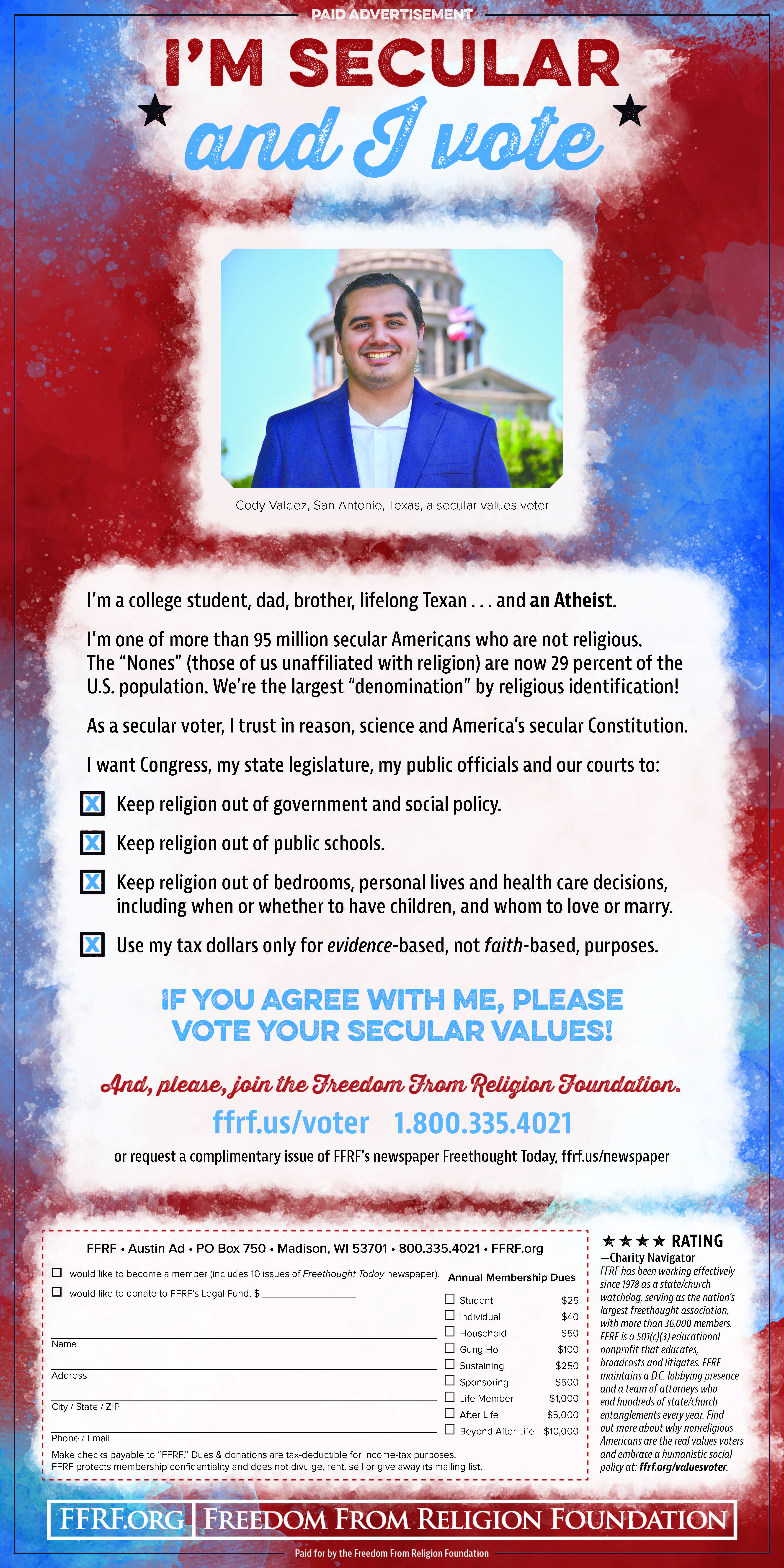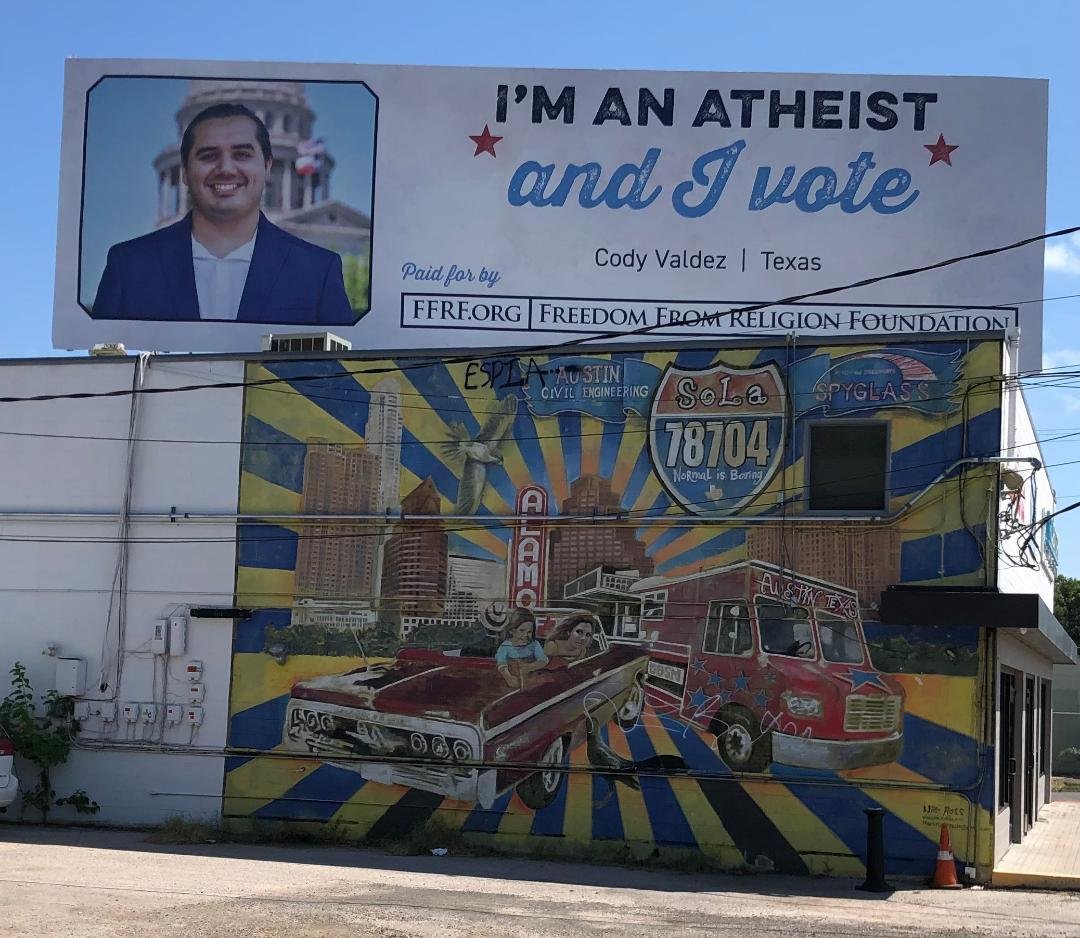
A 26-year-old pre-med college student is featured on a 14×48-foot billboard in Austin proudly proclaiming “I’m Atheist and I vote” that is up at South Lamar (west side) and Manchaca Rd., as part of a national multimedia secular voter campaign launched by the Freedom From Religion Foundation in this critical election year.
 Cody Valdez, representing Texas in FFRF’s campaign, will also be featured in a full-page ad headlined “I’m Secular and I Vote,” running in the Austin American-Statesman on Sunday, July 3. The San Antonio resident is pictured in front of the Texas State Capitol.
Cody Valdez, representing Texas in FFRF’s campaign, will also be featured in a full-page ad headlined “I’m Secular and I Vote,” running in the Austin American-Statesman on Sunday, July 3. The San Antonio resident is pictured in front of the Texas State Capitol.
“I serve as encouragement to others to pursue rationality and secularism openly,” says Valdez.
Valdez is one of 75 million nonreligious Americans who want Congress, state legislatures, public officials and courts to listen to “secular values voters” by keeping religion out of government and social policy — and that includes on the urgent question of abortion rights.
“FFRF is putting public candidates and officials on notice that the nonreligious now represent nearly a third of all adult Americans, that WE are the true ‘values voters’ and that it’s time that our secular viewpoint be heard and represented,” says Annie Laurie Gaylor, FFRF co-president.
In the print ad, Valdez notes, “The ‘Nones’ (those of us unaffiliated with religion) are now 29 percent of the U.S. population. We are the largest ‘denomination’ by religious identification!” Among Americans under 30, 36 percent identify as religiously unaffiliated.
In Travis County, the percent of adults identifying as atheist, agnostic or nothing in particular is higher than the national average at 33 percent.
Cody has three children and worked previously as an on-site manager at Northside Independent School District, at times serving underprivileged families and children with special needs. “I volunteered to prepare and serve meals for children during the height of the COVID pandemic,” he said. He is a pre-med senior and psychology major at UTSA.
Saying he “trusts in reason, science and America’s secular Constitution,” Valdez lists a compelling number of secular voter demands: To keep religion out of government and social policy, out of public schools, and out of bedrooms, personal lives and health care decisions — including when or whether to have children, and whom to love or marry. “Use my tax dollars only for evidence-based, not faith-based, purposes,” he emphasizes.
FFRF is running the billboards and newspaper ads in time for the Independence Day weekend in about half of the United States, with the rest appearing around Sept. 17, Constitution Day.
The campaign is particularly urgent coming on the heels of the Supreme Court decision to overturn Roe v. Wade. Gaylor observes that 98.8 percent of FFRF’s membership supports Roe, which is consistent with a YouGov analysis showing that atheists, at 91 percent overall, are the most likely to identify as pro-choice.
Gaylor called the Supreme Court trend to privilege religion, as well as the likely banning of abortion in more than half the states, alarming. “That’s why our secular voices must be heard.”
The Freedom From Religion Foundation serves as the largest association of freethinkers in North America, with more than 36,000 members including more than 1,500 in Texas, and works as a state/church watchdog to safeguard the constitutional principle of separation between state and church. To learn more, visit: ffrf.org.


